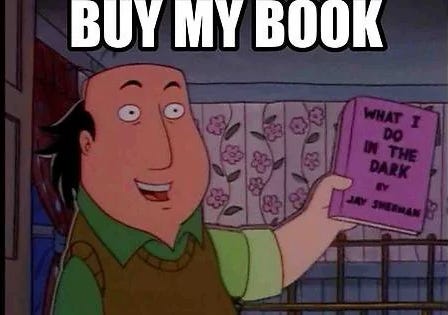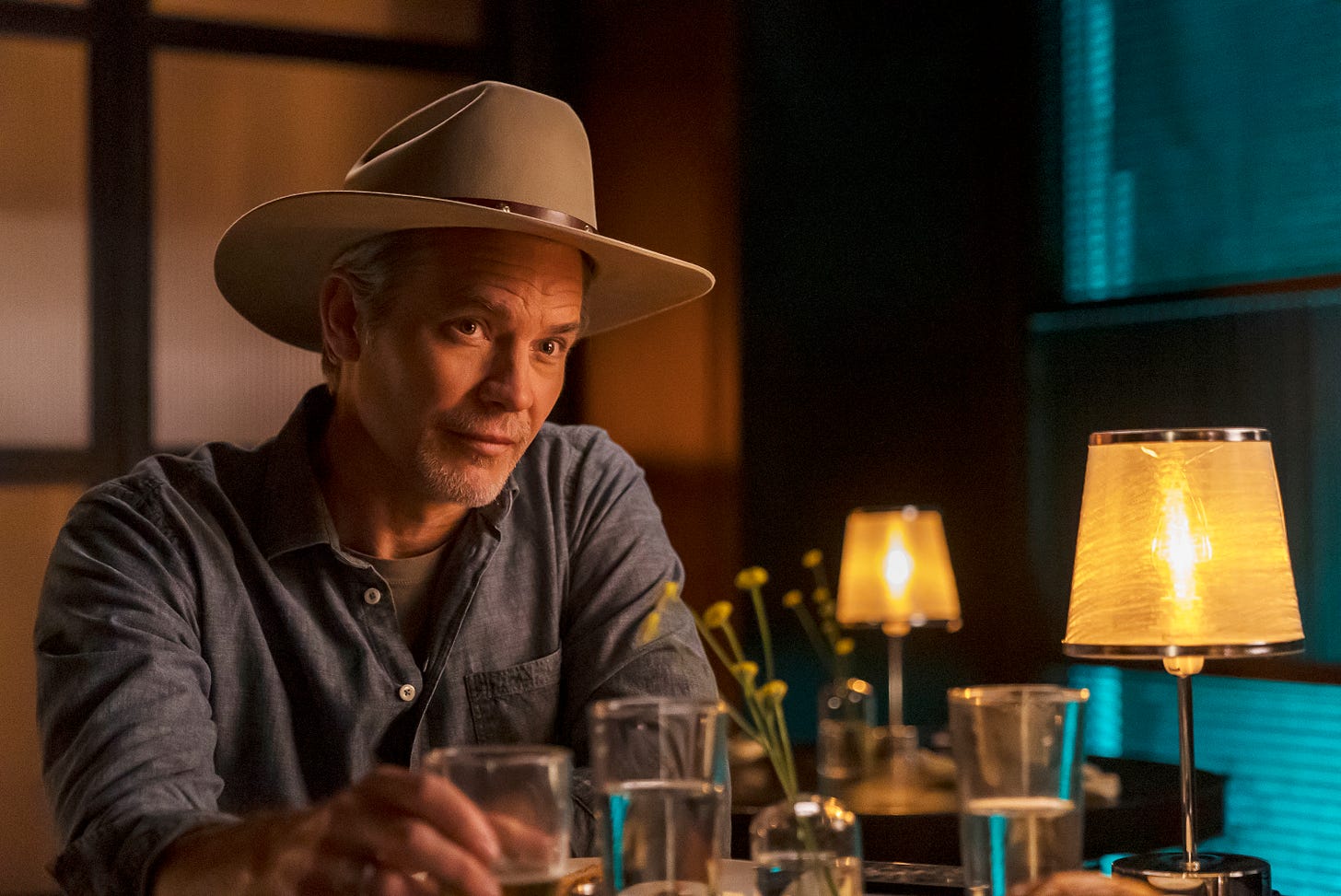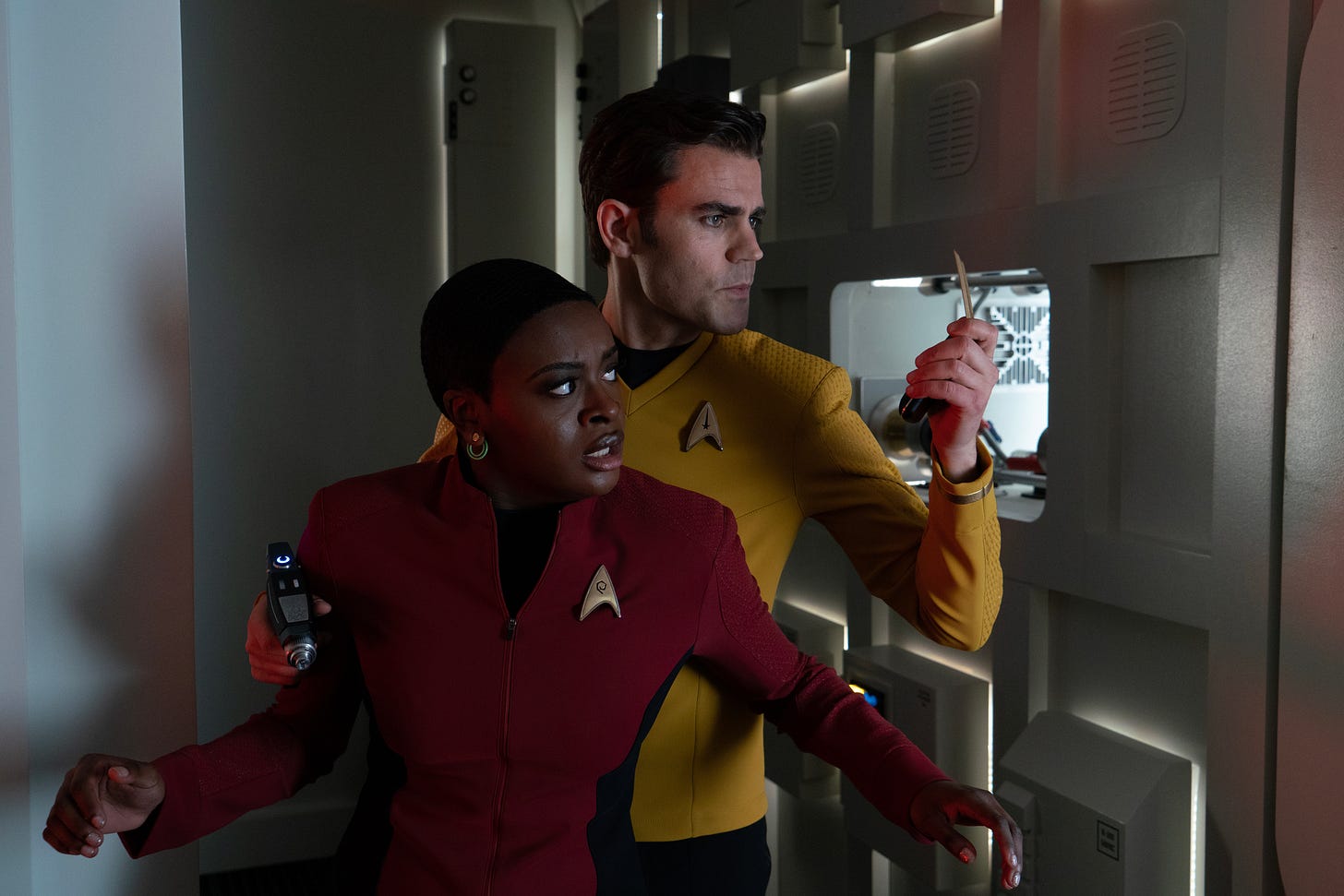Welcome to my new book, [expletive deleted]!
An 'O.C.' oral history, 'Justified' returns, 'Minx' survives Peak TV crash, and more
This week’s What’s Alan Watching? newsletter coming up just as soon as I rip some donuts in the gas cloud…
California, here we come (again)…
It’s been four years since I published my most recent book, The Sopranos Sessions. (Still on sale wherever books are sold, and a fine companion to any first-time watch or binge!) It has been nearly 20 years, meanwhile, since I published my first, the skimpy, long out-of-print, colorfully-titled Stop Being a Hater and Learn to Love The O.C.
Well, I’m back in the book game, and this time I’m going right back where I started from, with an exhaustive oral history called Welcome To The O.C. Here’s the cover:
The book features material culled from dozens of new interviews(*) with every main cast member of the mid-Aughts Fox teen drama, its creator Josh Schwartz, his fellow showrunner Stephanie Savage, and a good chunk of the creative team, several memorable recurring players, bands featured on a show that became famous and trailblazing for its use of music, etc. It’s a portrait of a pop culture comet, which had a beloved and hugely influential first season, then many stumbles across the way — some self-inflicted, some well out of the series’ control. Everyone was very candid about what was good and what was bad — the chapters on Season Three and Mischa Barton’s exit are particularly blunt from all involved — and I’d like to think that we all captured why people cared so much about the series back in the day.
(*) I conducted most of these interviews myself, but some were handled by my ace researcher Oriana Schwindt, who was an incredible help in getting this all done on a far tighter timeline than is normal for books of this kind. I can’t recommend her more highly, if you’re looking for a writer, editor, researcher, and/or sounding board; her details are here.)
The 20th anniversary of the premiere is in a couple of weeks, on August 5. The book, though, won’t be on sale until November 28 (aka the start of holiday gift-buying season). But as any author can and should tell you, pre-orders are colossally important these days, because they tell booksellers (not just Amazon, but all of them) how much demand there may be for this thing, and thus how much to have in stock upon release, etc. So if you’re interested in the subject matter, you can find pre-order links to all the major retailers, both chain and indie, at the book’s official page on Harper Collins’ website. Or, as Jay Sherman’s cardboard standee once told us all:
You will be hearing a whole lot about this in the coming months. I’m two decades older now and tend not to cover this sort of show much these days. But rewatching all of it last year (on what was then called HBO Max) in prep for the book reminded me of how much I loved it — not just in that first season, but in moments throughout the entire series. (Yes, even on occasion in Season Three.)
I hope you enjoy it. Chrismukkah’s come early!
We interrupt this programming…
I’m glad the book announcement happened when it did, because there may not be a newsletter for the next week or two. I have some non-TV stuff happening that is going to take me off the grid for some amount of time, but hopefully not for too long. But it may also mean that the next newsletter hits your inboxes on a day other than a Friday, depending on how much catching up I need to do. Apologies in advance for the change in routine, but as the saying goes, men plan newsletters, and God laughs.
The return of Raylan Givens is more than, well, Justified
As I teased last week, we published my review of Justified: City Primeval on Monday, and my interview with Timothy Olyphant on Tuesday. In both, you’ll notice a fair amount of talk about how many of the extra-legal stunts Raylan pulled back in the original run seem a lot less charming in a post-George Floyd world. Among the most impressive things City Primeval does is to show how Raylan has evolved, without undercutting the pure charm of the character.
And as much as I love Boyd Crowder, Art, and the rest of the old gang, it feels like a huge relief to be taking a break from matters in Harlan. The original series had more or less played out all those conflicts and character dynamics, and it feels good to start fresh with a new ensemble. Especially when the ensemble is as good as this one. Aunjanue Ellis in particular is arguably the best female foil Raylan’s ever had, but I really like everybody this season.
I won’t be doing weekly recaps for Rolling Stone, but may do some periodic checking in throughout the season. The first two episodes have a lot of strong material, like Raylan’s first visit to a Detroit courtroom, or his, um, conversation with Clement Mansell at the end of the second episode. But I will definitely have things to say after the finale has dropped. Glad to have the man in the hat back.
Minx and the case of TV musical chairs
Minx, the charming Seventies period comedy about a feminist reporter (Ophelia Lovibond) and a dirtbag pornographer (Jake Johnson) who team up to create a skin mag for women, streamed its first season on what was then called HBO Max. Its second season was nearly finished filming when it got Zaslav’ed. Fortunately, it was produced by Lionsgate, rather than a Warner Bros. Discovery subsidiary, and thus it was easy to let Lionsgate-backed Starz pick it up, largely for the cost of filming part of one episode, plus post-production. Not a bad deal for Starz, which debuts the new season tonight at 9 on the linear channel, and is already streaming on the digital version And the new season (of which I’ve watched all eight episodes) is a lot of fun.
It’s also unintentionally meta, as the characters spend a lot of time worrying that their success can be snatched away in an instant, and concerned about potential sales, mergers, and other business arrangements. So rather than write a full review of a season whose quality feels more or less on par with the one I wrote about last year, I used the new season as an excuse to expand on some thoughts I’ve expressed here, regarding how the Peak TV implosion and the rampant Zaslav’ing (even by non-Zaslavs) has broken a lot of the unspoken promises of the streaming era, particularly the assurance that shows would always be around for you to watch when you were ready for them.
Star Trek: Strange New Worlds recaplet: “Lost in Translation”
At the very end of “Lost in Translation,” a big thing happens: James Tiberius Kirk meets Spock for the first time, and invites his future best friend to join him and Nyota Uhura at a table in the ship’s mess hall.
Now, Strange New Worlds already has four different characters from the original series as part of its main cast. But Dr. M’Benga only appeared a couple of times back in the day, while Christine Chapel was a one-note recurring character who primarily interacted with Dr. McCoy and Spock. So this closing scene not only brings the two main TOS characters together, but puts them together with Uhura, thus inspiring an image that is the most that this modern Star Trek series has resembled its classic inspiration.
This can be something of a double-edged sword. It’s exciting to see these new versions of famous oldies, especially when they’re written and played as well as Uhura and Spock have been. (We’ll get back to Kirk in a minute.) But the more that SNW introduces TOS characters, the greater the risk that the audience will start to look at Pike, Una, and the others as mere placeholders for the “real” Enterprise crew. Maybe it’s not that big a risk, simply because Anson Mount and the others are just that good, but I fear that we’ll soon be getting Muppet Babies versions of Chekov, Scotty, Sulu, McCoy, maybe even Janice Rand. (Hey, we already have a new version of Chief Kyle, even if, as on the original show, all he does is run the transporter room.)
In this case, though, “Lost in Translation” feels like an episode that was written to spotlight Uhura’s relationship with Pike, then got rejiggered as part of this season’s move to give Mount more time with his new baby. There’s still a decent amount of Pike here, and arguably the most emotional part of the hour is him deciding once again to trust Uhura’s instincts, when the safer and more obvious choice would be to keep believing that she’s suffering a mental breakdown. But the majority of the time here is spent on Jim befriending Nyota and trying to help her through this crisis.
For all I know, this was always written as another Kirk spotlight, since there are some very effective scenes dealing with his relationship with Sam, and with La’an having to deal with the fact that this version of Jim has no idea that they fell in love while time traveling. But where “Tomorrow and Tomorrow and Tomorrow” mostly did a good job of leaning into the cocky, impulsive traits that have always defined Kirk, this one mostly goes back to him being reserved and empathetic — Pike Lite, essentially. If this is how he’s going to be written, and/or if this is how Paul Wesley is going to play him, I’d rather we just stick with the main crew. As we saw in the season premiere, the regular Strange New Worlds ensemble is more than capable of picking up the slack when Mount isn’t around.
Still, Celia Rose Gooding is terrific throughout this one, and it was nice to be reminded of her friendship with Hemmer, even as the B-story was one of the bigger Pellia spotlights so far. And the decision to destroy the mining station in order to free the aliens was another of those moments that Strange New Worlds does so well, where we can really feel the wonder the wonder of space travel and discovering new life forms.
In case the newsletter does have to take some time off, let me just say about next week’s Lower Decks crossover episode that it’s a lot of fun, while also functioning just fine for those who don’t watch the other show.
That’s it for this week! What did everybody else think?










Unrelated to the newsletter topics... last night's "What We Do In The Shadows" was insane, even by the standards of the show. Is there anything rejected in the writer's room because it feels as if they will do anything and everything and it always works.
Rewatched S1-2 of The O.C. a year or so ago. Still fun, but man did they burn through plotlines. Relationships come and go in 2-3 episodes, affairs appear out of thin air and somehow Julie Cooper wasn't in jail for multiple crimes.